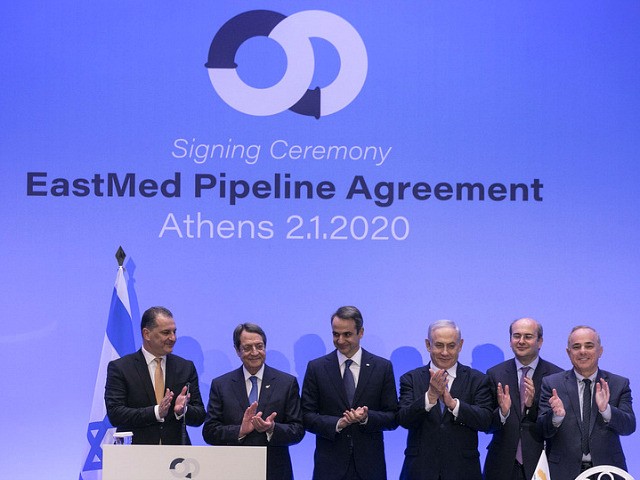TEL AVIV — Israel, Greece, and Cyprus signed a historic agreement Thursday for the Eastern Mediterranean project that will see Israeli gas delivered to Europe via an undersea pipeline, overturning Turkey’s efforts to thwart the deal.
The accord was signed in Athens at a trilateral summit between Prime Minister Benjamin Netanyahu, Greek Prime Minister Kyriakos Mitsotakis, and Cypriot President Nicos Anastasiades.
Israel’s Energy Minister Yuval Steinitz, Greek Environment and Energy Minister Konstantinos Hatzidakis and Cypriot Energy, Commerce, Industry and Tourism Minister Georgios Lakkotrypis signed the deal.
In a statement, Netanyahu called it an “extraordinary development.”
“This is a historic day for Israel, because Israel is rapidly becoming an energy superpower, a country that exports energy,” Netanyahu said.
“[W]ith the exportation that will become possible via this pipeline, we will be able to provide hundreds of billions of shekels in revenue to the citizens of Israel—for their welfare, for health, for the young people and the elderly, for everyone. This is an extraordinary development,” he said.
“This is a true alliance in the Eastern Mediterranean that is economic and political, and it adds to the security and stability of the region,” he said.
The explorations of gas-rich areas in the eastern Mediterranean have sparked a diplomatic dispute between Cyprus and Turkey. Turkey occupies the northern part of the island and is already facing sanctions by the EU for drilling off the coast of Cyprus.
Netanyahu also said that a supply agreement signed with Arab countries would strengthen “peace, the economy and the future.”
Secretary of State Mike Pompeo gave his backing to the project at a March meeting in Jerusalem.
The gas pipeline is due to be completed in 2025.
Italy will join at a later date followed by Egypt, Netanyahu said.
Europe is eager to diversify its energy supplies, which mainly come from Russia. The EastMed project would provide some 10 percent of Europe’s natural gas supply.
“This is a tremendous change. Israel was always a ‘fringe country’ a country that did not have any connections, literally and figuratively,” Netanyahu said.
“Now, in addition to our foreign relations, which are flourishing beyond all imagination and everything we have known, we have a specific alliance towards these important goals in the Eastern Mediterranean,” he concluded.

COMMENTS
Please let us know if you're having issues with commenting.